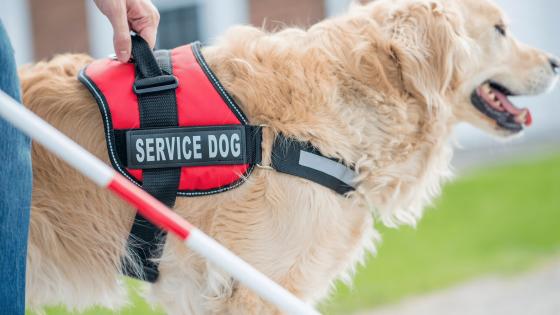Service animals play a crucial role in supporting individuals with disabilities, providing assistance that enhances independence and accessibility. As faculty and staff, understanding the role of service animals helps create an inclusive environment for all students.

July Edition of Access Matters Small changes, lasting impact for all students.
Understanding Service Animals on Campus
Supporting Students with Service Animals
What is a Service Animal
Under the Americans with Disabilities Act (ADA), a service animal is a dog (or, in some cases, a miniature horse) that is individually trained to perform specific tasks for a person with a disability. These tasks may include:
- Guiding individuals who are blind or have low vision
- Alerting individuals who are deaf or hard of hearing
- Assisting individuals with mobility disabilities
- Detecting medical conditions such as seizures or changes in blood sugar
Key Guidelines for Faculty & Staff
- Service animals are allowed anywhere students can go, including classrooms, labs, and residence halls.
- Service animals do not need certification, vests, or special identification.
- Registration of service animals with the DRC is not required, though it is encouraged.
- Emotional Support Animals (ESAs) are not service animals and do not have the same public access rights under the ADA.
How You Can Support Students with Service Animals
- Allow service animals in class without requiring documentation.
- Do not distract, pet, or interact with the animal.
- If a service animal’s presence causes an issue (such as allergies or fear), work with your university’s disability services office to find an accommodation.
By understanding service animals' role and rights, we can foster an inclusive and welcoming campus environment for all students.
Two Questions You Can Ask About Service Animals
If it is not obvious whether an animal is a service animal, faculty and staff may ask only these two questions:
- Is this a service animal required because of a disability?
- What work or task has the animal been trained to perform?
Do not ask about the person’s disability, require documentation, or request that the animal demonstrate its task.
Key Differences Between Service Animals and Emotional Support Animals (ESAs)
Service animals are dogs (or, in some cases, miniature horses) that are individually trained to perform specific tasks directly related to a person’s disability, such as guiding someone who is blind, alerting to seizures, or retrieving items. Service animals are protected under the Americans with Disabilities Act (ADA) and are generally allowed to accompany their handler anywhere on campus where the public or students are permitted, including classrooms and dining areas. Service animals do not have to be registered with the Disability Resource Center (DRC), but doing so is recommended to help plan for access and minimize barriers.
In contrast, emotional support animals (ESAs) provide comfort and companionship simply through their presence and are not trained to perform disability-related tasks. ESAs are not covered by the ADA and therefore do not have the same public access rights as service animals; however, they may be approved to live with a student in campus housing under the Fair Housing Act (FHA). ESAs must be approved through the DRC for residential accommodations but are not permitted in classrooms or other campus buildings. ESA's are limited to campus housing only.
Introducing the Course Flexibility Plan (CFP)
Launching Fall 2025
DRC Teams Instructor Forum
The Teams Instructor Forum is a dedicated space for faculty and instructors to share concerns, ask questions, and discuss challenges related to the DRC Online Portal.
This forum provides an opportunity to engage with colleagues, exchange best practices, and seek guidance on implementing accommodations effectively.
Whether you’re experiencing technical issues, need support navigating the portal, or have questions like, “What steps should I take if a student requests flexibility accommodations?" or "Where can I find access to the DRC Online Portal?" a dedicated DRC team member will be available to answer any questions and provide assistance.
The Instructor Forum encourages collaboration and ensures you have the resources and support needed to effectively implement accommodations.
